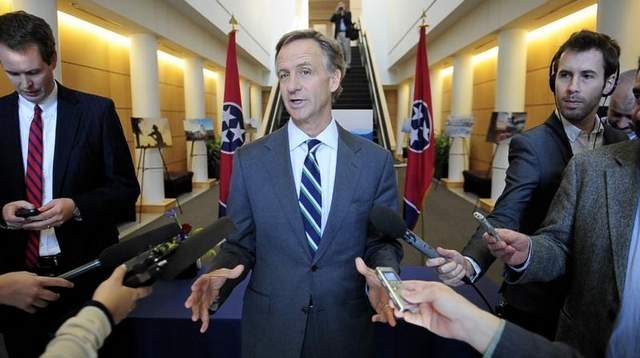Employer tax may sway Gov. Bill Haslam on Medicaid
Friday, January 1, 1904
NASHVILLE - Tennessee companies employing 50 or more lower-paid workers are staring at paying up to $90 million collectively in annual tax penalties if the state rejects expanding TennCare, according to a national tax preparation firm.
Jackson Hewitt Tax Service's estimate comes in a new report shedding light into a little-discussed provision in President Barack Obama's Affordable Care Act.
The report outlines the tax consequences for some employers with full-time employees in states that forgo expanding Medicaid after the U.S. Supreme Court ruled last year that doing so is voluntary instead of mandatory.
Medicaid is operated as TennCare in Tennessee.
Republican Gov. Bill Haslam told reporters Wednesday that employer liability, which the tax preparation company estimated at $59 million to $89 million annually, is part of his calculus as he weighs whether to extend TennCare coverage to an estimated 181,700 Tennesseans.
"It's a complex decision," Haslam told reporters. "You have the impact on the state, impact on people who would be potentially insured, impact on businesses, impact on hospitals."
As a result, the governor continued, "anybody who thinks this is a no-brainer decision either way, I don't think has really done the work on it."
At issue for employers is the interplay between the expansion of Medicaid, a state and federally funded program, and the health care insurance changes, which are state or federally run, online markets where families earning between 100 percent to 400 percent of the federal poverty level can find insurance with tax credits and subsidies.
Because the Medicaid expansion covers people with incomes of 100 percent to 138 percent of poverty, these people can enroll in the exchanges.
The report notes that under the "shared responsibility" provisions of the law, employers that offer health coverage and have 50 or more full-time equivalent employees generally have to pay up to $3,000 penalties for each worker who enrolls in the premium tax credits through the exchange.
They don't if the workers enroll in Medicaid.
The Jackson Hewitt study was authored by Brian Haile, the company's senior vice president for health policy. Until recently, he was the head of the Tennessee Health Insurance Exchange planning unit.
In the examination of the impact on states, the study estimates 71,153 Tennesseans fall into the 100 and 138 percent of poverty level category. Some 29,785 of them would be eligible for the premium assistance tax credits.
"In the 22 states that have opposed, are leaning against or remain undecided about expanding Medicaid, we predict employer-shared responsibility costs could total $876 million to $1.3 billion each year," Haile said.
Haile called the wallop to employers "a sleeper issue" and said the firm felt obligation to let employers know what could happen to them.
While Jackson Hewitt isn't taking a position on the Medicaid expansion issue itself, Haile said, the report notes decisions should reflect the "very real costs" of the shared responsibility penalties for employers.
Meanwhile, Haslam told reporters he continues to weigh the pros and cons of Medicaid expansion.
On the plus side, advocates say, the federal government will pay the entire costs of the program for its first three years, gradually decreasing its share to 90 percent after 2019. More people will be covered. And hospitals, which stand to lose billions under special Medicare reimbursements under the federal law, will be able to offset some losses through the Medicaid expansion.
But conservatives in the GOP-led Legislature say there are no guarantees that a financially strapped federal government will meet Obama's commitments. Tea party Republicans object that it's tied to "Obamacare" and also will increase the federal debt.
Tennessee would see some $1.4 billion in federal funds during the first two years of an expansion.
Haslam said his decision won't be based on politics but on what's best for the state.
"We're trying our hardest to make the right decision, regardless. A lot of people say the governor should never propose something that he or she can't pass. But I guess I hadn't bought into that theory."

